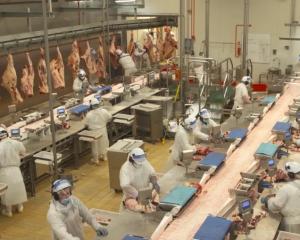
Benatrade Angus will offer 30 yearling bulls and six 2-year-old bulls at an on-farm auction in Taramoa next week.
Stud owner Dave Marshall said he had been selling Angus bulls for 25 years.
The opening bids would be higher next week than at any previous sale due to the confidence in the beef schedule price.
Usually bidding at the annual sale starts at $2000, but it would open at $2500 next week.
"Where the schedule is now is where the marker will be for the bottom of what the yearling bulls are sold for."
He used a Helmsman auction system, where all the bulls open for bidding simultaneously, allowing buyers to place bids on a slip for a chosen lot.
The new $2500 opening bid price was set because a bull bought at the sale would be able to be slaughtered in February and fetch more than $2500.
There was usually a full clearance at the auction, or the following day, and he expected no difference next week.
"It is looking promising — there is a lot of inquiry from Southland and Otago."
If any of the bulls did not sell, they would be slaughtered for grinding beef.
Cattle buyers from meat processors were calling him seeking animals to slaughter.
Traditionally, no-one from any meatworks would be contacting him for cattle, but now multiple companies were calling.
"They are that short on beef."
At the sale they usually offered up to 100 Angus heifers, but no female livestock would feature at the auction this year.
The heifers were usually bought from his clients as 6-month-old calves and then auctioned as yearlings.
"The market was too hot in the autumn and I wasn’t prepared to take the risk."
A beef cattle shortage was biting at the moment due to fewer people rearing calves when the schedule was down a couple of years ago.
He expected a lot more calves were being reared now because he recently struggled to find milk powder to buy.
"There’s no milk powder in the South Island."

From his mob of 95 bulls, most yearlings were selected for the sale if their genetics could providing easy calving when put over a 15-month-old heifer, due to lighter birth weights and good growth rates for finishing.
"We just about guarantee our calving ease."
Mr Marshall and his wife, Juli’s, 240ha farm lies between 5m and 9m above sea level to the west of the lower reaches of the Ōreti River, northwest of Invercargill.
"We are under the watchful eye of Environment Southland."
He had a good working relationship with the council, he said.
Mr Marshall’s family introduced Angus cattle to the farm in 1938.
Benatrade was the southernmost Angus stud in the world, so the cattle needed to be hardy.
"They’ve always needed fat to survive in this environment."
Rural Livestock agent Rob Fowler, of Taieri, said nearly 1000 cattle were offered and all sold at the Balclutha Spring Cattle Sale last month.
Two-year-old steers and heifers sold for about $4.80/kg.
Straight beef breeds continue to fetch a premium.
The average price fell from a record high at a cattle sale in Balclutha in late August.
"It just went through the roof."
A reason for prices being down at the recent cattle sale was more dairy genetics featuring in the latest offering in Balclutha.
Some heat had left the beef cattle market, allowing buyers to anticipate a future profit margin could be made on the livestock.
"Sellers might have been a wee bit disappointed because it came off that record high, but it has come down to being fair on the vendor and fair on the purchaser."
PGG Wrightson corporate affairs general manager Julian Daly said a national lack of supply of calf milk replacer was due to unprecedented demand from more calves being reared this year.
PGG Wrightson had covered orders from existing and regular clients for the product but some walk-in customers had been unable to secure supply.
"PGG Wrightson has moved swiftly and is working closely with its suppliers, who are manufacturing at capacity to meet demand."












